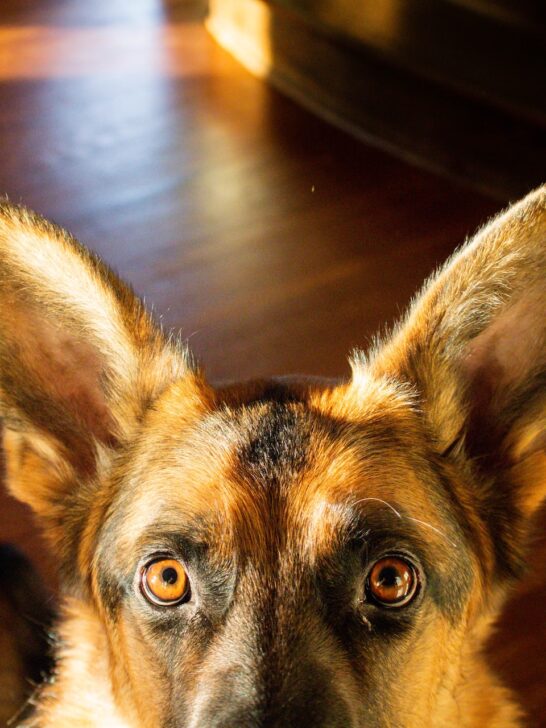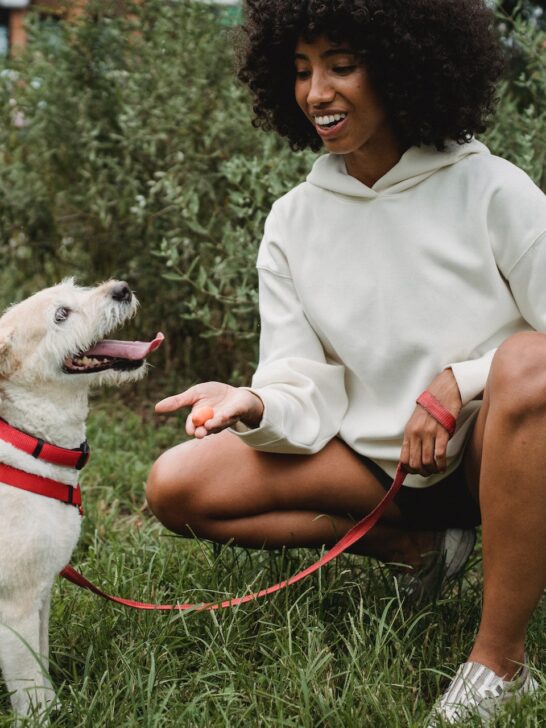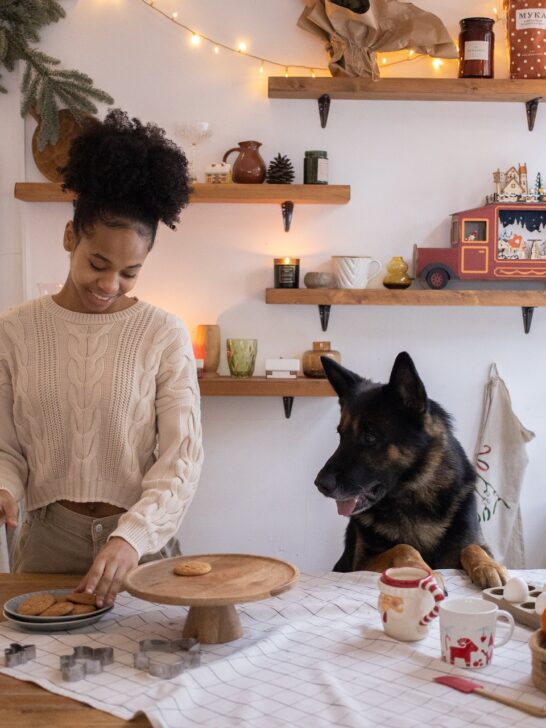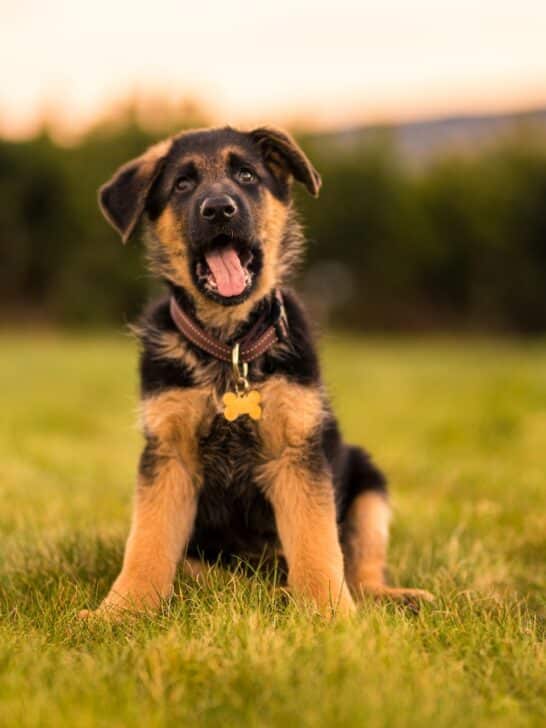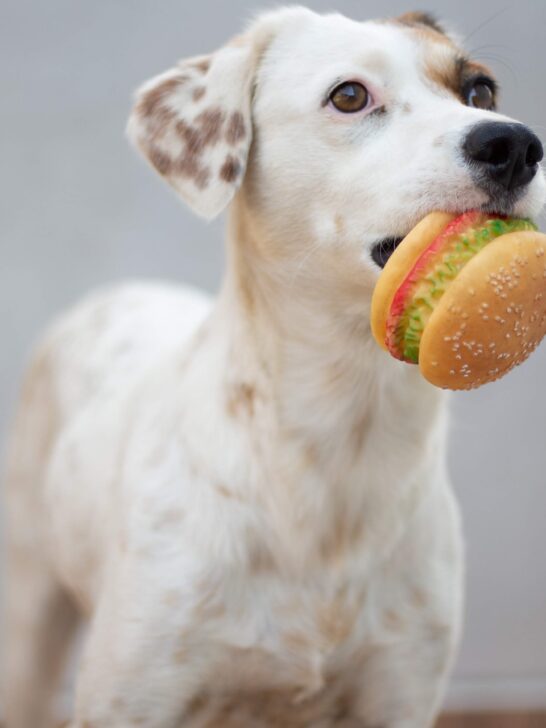How to Take Care of a 7-Month-Old German Shepherd
When a young GSD reaches the 6 to 7-month mark in their growth, German Shepherd owners can begin to experience a different set of challenges.
Your once cute little lovable puppy can become rowdy and troublesome if you don’t set proper corrections and reward good behavior.
The seventh month is a crucial time in your dog’s physical development, and how you care for them will shape their health and personality for the rest of their lives.
In this article, we tackle essential information you need to know about taking care of your 7-month GSD.
Average Size and Height

By seven months, your German Shepherd will reach approximately half its full adult size. In general, 7-month-old German Shepherds can gain up to 30% of their total adult weight.
Male dogs will stand 19 to 20 inches tall at the withers, while a female German Shepherd will be close to 17 to 19 inches tall.
Regarding weight, males should fall between 57 and 62 pounds, while females usually hover around the 50-pound mark. In addition to physical changes, your puppy will start to look much more like an adult dog.
They should have all 42 adult teeth, and their coat will be fully developed.
Nutrition For 7 -Month-Old German Shepherd Puppies
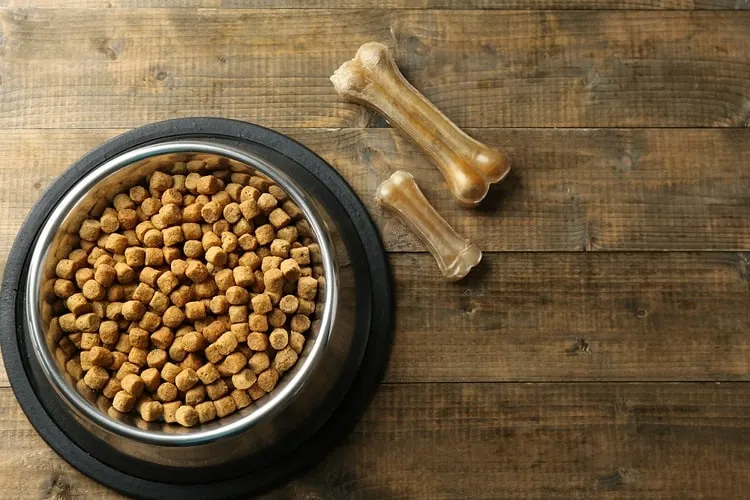
A German Shepherd needs a diet that contains lean proteins, healthy fats, and complex carbs. The best way to achieve this is by feeding them an all-natural diet with plenty of chicken, fish, and turkey.
It would be best to supplement this with fruits and vegetables like apples, bananas, blueberries, carrots, peas, and pumpkins.
Be aware that some fruits and vegetables can be toxic to dogs, so avoid feeding them too many treats. Lean, non-fatty treats are the best option for dog training purposes.
It’s important not to overfeed your GSD. Overfeeding can lead to obesity, which puts your GSD at risk for health problems like elbow and hip dysplasia, arthritis, diabetes, hypertension, and cancer.
Following these nutritional guidelines can help your German Shepherd live a long and healthy life.
Physical and Behavioral Changes
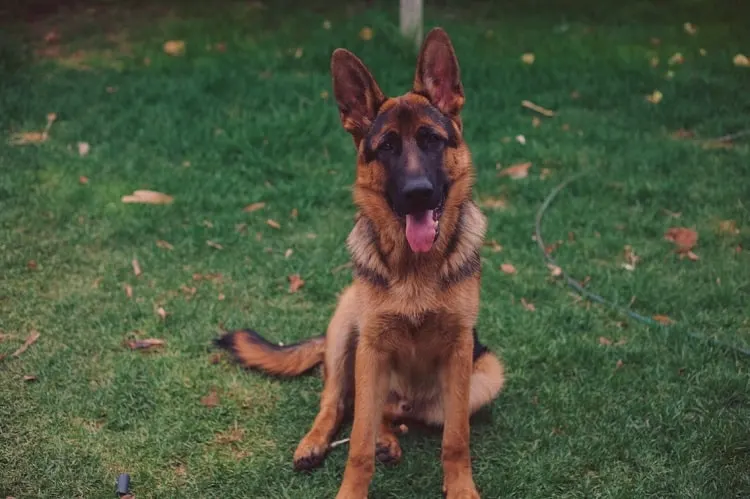
Pet parents should understand that dogs around this age may become more barky, bossy, and destructive as their hormone levels change.
It is called the “fear period,” and it’s a normal part of your puppy’s development. The best way to deal with it is to remain patient and consistent with your training.
Keep in mind that your dog may also start to exhibit signs of resource guarding during this time. Your dog may become possessive of toys, food, or other belongings.
Again, the best thing to do is to remain calm and consistent in your commands.
Your dog may lash out at other dogs or people in public places if you don’t stop this type of behavior now.
This sort of conduct must be nipped in the bud as soon as possible, or it might lead to more significant issues in the future. We recommend you avoid bringing your GSD to dog parks until they’re older.
With patience, you’ll get through this phase and come out with a well-adjusted dog.
Sexual Maturity at 7 Months
Most German Shepherds will reach sexual maturity by the time they are 6-7 months old. For males, this means that hormones will begin to kick in, and they will start to search for female mates.
As for females, their estrogen levels will increase and start to go into heat.
It is vital to keep your dog separated from other dogs in the neighborhood or at the local park, as they may try to mate with them. Additionally, males and females will begin to mark their territory during this time.
So if you see your dog lifting its leg in your home or yard, don’t be alarmed – it’s just a normal part of sexual maturity.
Training Your 7-Month-Old German Shepherd
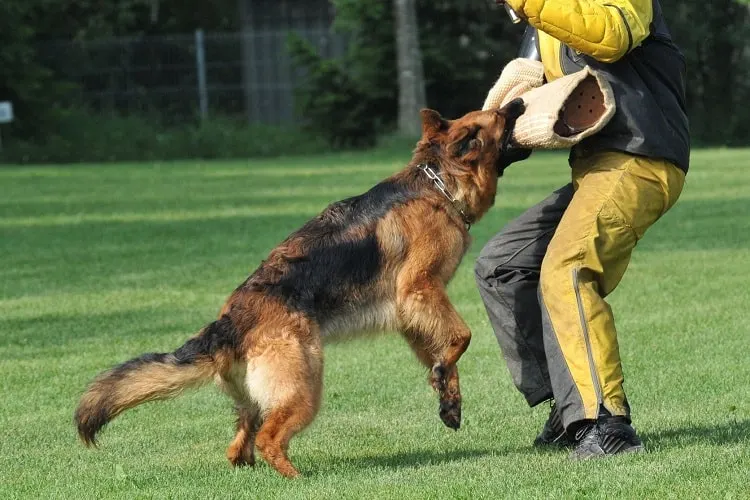
At the seven-month mark, your German Shepherd should have a solid foundation that includes bite inhibition, crate or potty training, and plenty of socialization.
It will be tough if they haven’t been fully socialized by now. The window for socialization is usually until about 16 weeks only.
They should also know at least five basic obedience commands and two advanced commands. From this point on, you should aim to teach them two new advanced commands per month.
Increase Positive Reward-Based Obedience Training
Start by rewarding your dog for good behavior with treats, petting, or verbal praise.
Once your dog understands what he’s being rewarded for, you can phase out the treats and use petting or verbal praise as the primary reinforcement.
As a good trainer, you should make sure to obedience train in a variety of different environments so that your dog can generalize his excellent behavior to any situation.
Positive training will go a long way in building a bond with your young dog.
Tips for Effective Training
Short and sweet is key to getting the most out of your good training sessions. Dogs have a short attention span and will quickly become bored or frustrated if you try to train them for too long.
- Start with basic commands and work your way up
- Keep training sessions short and sweet
- Train in a variety of different environments
- Use positive reinforcement (rewards)
- Be consistent with your commands
- Be patient
- Don’t punish your dog for making mistakes
- Correct unwanted behavior immediately
- Make training fun for your dog
- 1Practice regularly
With consistent and proper training, your German Shepherd puppy will learn to obey commands no matter where he is or what he’s doing.
Remember, dogs are never too old to learn; it just takes patience, consistency, and positive reinforcement.
Toys for Your 7-Month-Old German Shepherd

As a new German Shepherd puppy owner, the first few months can be challenging. Puppies are full of energy and seem never to stop moving.
They also like to put everything in their mouths. For a German shepherd puppy, finding safe and durable toys is essential.
- Kong toys – Kong toys are a type of rubber toy that you can fill with treats or food. It makes them an excellent option for keeping your puppy occupied and distracted from chewing on furniture or other belongings. They are trendy among German Shepherd puppies because of their durability and the fact that they can be filled with tasty treats.
- Nylabones – A generic term for a challenging, generally non-edible plastic toy, Nylabone refers to a company that produces dog chew toys and other pet goods.
- Rope toys – Rope toys are a great option for German Shepherd puppies because they are durable and can withstand a lot of chewing. They are also a good source of stimulation for dogs, as they are interactive toys that require interaction from the dog. It can help keep your pup occupied and entertained.
7-Month-Old German Shepherd Health Issues
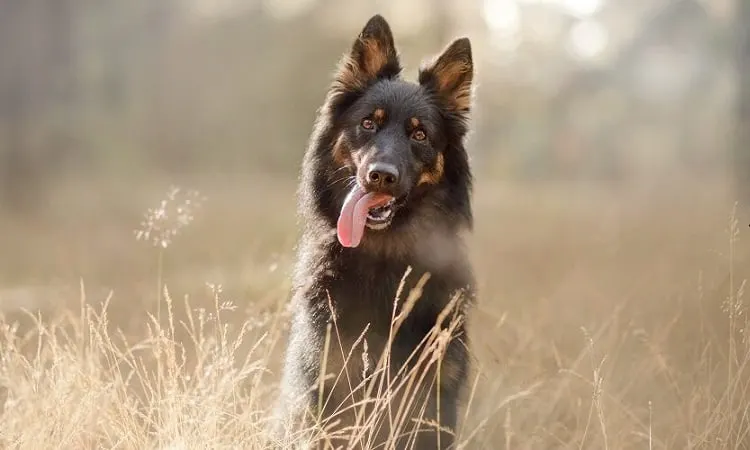
It’s always best to refer back to the average height and weight of the German Shepherd breed to know whether or not they are growing as expected vs. undergrowing.
It will help identify any health issues your pup may have. By the 7th month, your puppy must have the necessary vaccines for its early development.
German Shepherds are generally a healthy breed, but they are more susceptible to some health conditions than others.
Hip and Elbow Dysplasia
Hip dysplasia is a genetic illness that affects the hip joint. In dogs with hip dysplasia, the thigh bone does not fit snugly into the hip joint, which can cause pain and lead to arthritis.
Elbow dysplasia is a similar condition that affects the elbow joint, caused by malformation of the bones. It can also lead to pain and arthritis.
Both hip and elbow dysplasia are common in German Shepherd dogs and can lead to many health problems if not treated.
Allergies
German Shepherds are also prone to allergies. Allergies can cause various symptoms, including itching, excessive licking, and hot spots.
If your German Shepherd shows any of these symptoms, it is vital to take them to the vet to rule out other possible causes and get them started on the appropriate treatment.
Von Willebrand’s Disease
Von Willebrand’s disease is a blood disorder that affects German Shepherds. It is caused by a deficiency of Von Willebrand factor, a protein that helps the blood clot.
This disease can lead to excessive bleeding and can be fatal if not treated.
Diabetes
Just like humans, dogs can develop diabetes. Symptoms of diabetes in dogs include increased thirst and urination, weight loss, and lethargy. If left untreated, the condition can lead to serious health problems.
Other Health Issues to watch out for:
- Gastric Dilatation-Volvulus (GDV)
- Epilepsy
- Hemophilia
- Cataracts
- Degenerative Disc Disease
Taking your dog to the vet for regular check-ups can help you catch any potential health problems early on. It will give your dog the best chance for long and healthy life.
Exercise Needs For a 7-Months-Old German Shepherd
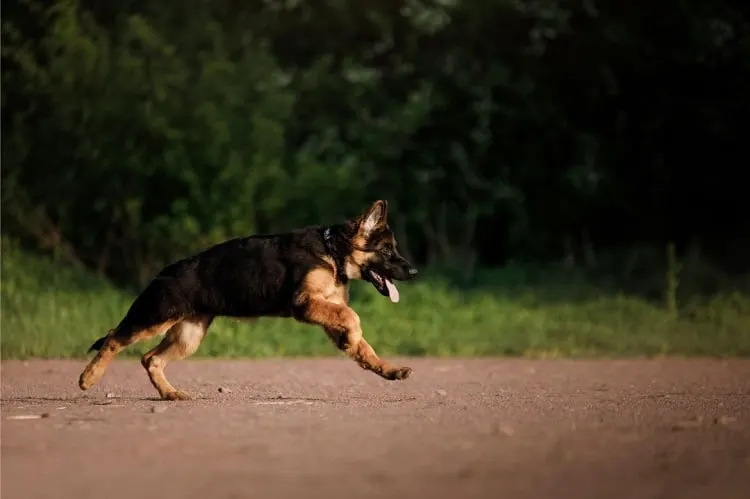
German Shepherds are one of the most popular breeds of dogs for a reason: they’re incredibly intelligent and always up for a challenge.
But that also means they need plenty of exercise and playtime to stay happy and healthy.
A 7-month-old GSD needs enough exercise, which is at least 35 minutes every day. That can be one long or two shorter walks, but whatever you do, ensure they’re getting their heart rate up and burning off some energy.
But don’t forget that as they’re still growing, too much impact on their joints can be harmful, so take it easy on them until they’re fully grown.
In addition to physical exercise, your seven-month-old German Shepherd also needs mental stimulation exercise.
You can achieve this through training exercises like obedience or agility or playing games like fetch. Keeping their minds active can help prevent boredom and destructive German Shepherd behavior.
Also read:
- How to Take Care of an 8-Month German Shepherd
- Everything you Need to Know About Your 5-Month-Old German Shepherd
- How to Take Care of a 4-Month-Old German Shepherd
Conclusion
A seven-month-old German Shepherd pup is full of energy and potential. They are at a stage where they need plenty of physical and mental exercise to stay happy and healthy.
Choosing suitable toys for them is crucial, as they are known to be destructive chewers. And finally, regular vet check-ups are essential to catch any potential health problems early on.
Following these simple tips can help your seven-month-old German Shepherd have a long and happy life.
Resources:

























